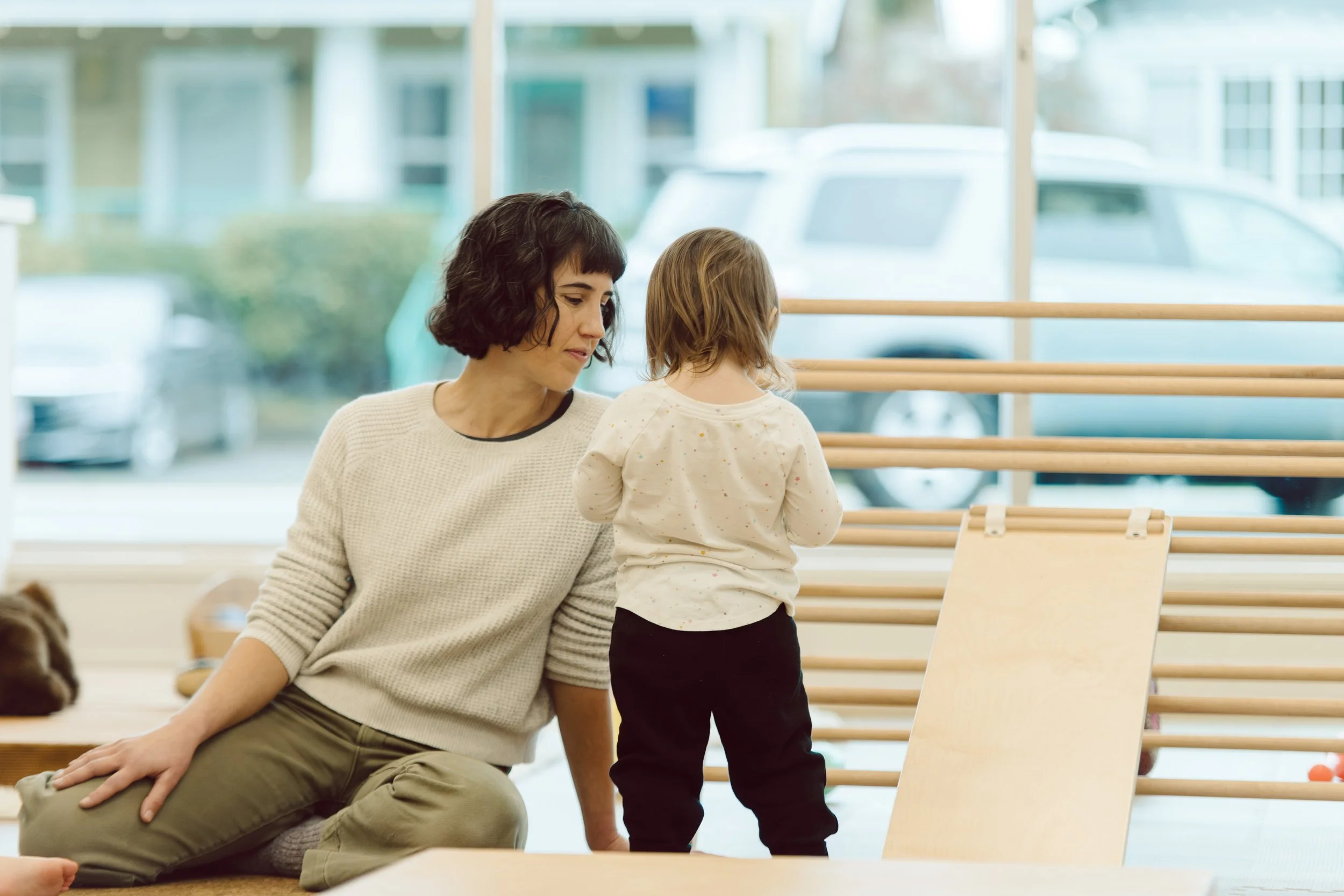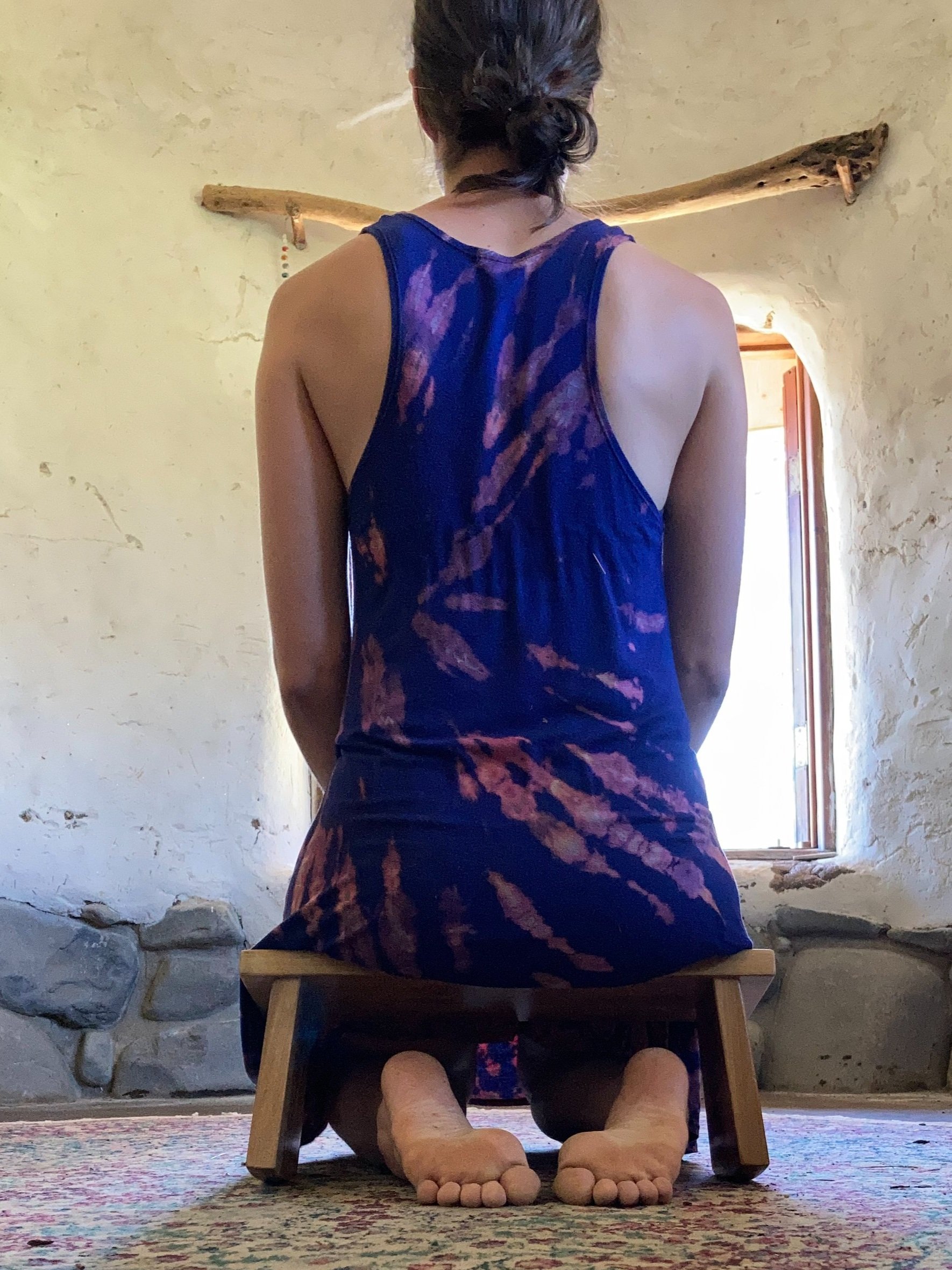“The dream of my life
Is to lie down by a slow river
And stare at the light in the trees–
To learn something by being nothing
A little while
but the rich
Lens of attention. ”
A parent recently asked me, “Why is quiet observation a part of this class?” I’m so grateful they inquired because this is such an important part of RIE® Parent-Infant Guidance™ classes. Here are 7+ benefits that can come from carving out space for quiet observation.
Built-In “Wants Nothing” Quality Time
If you’re carving out regular time for “wants nothing” quality time at home throughout the week, I applaud you! I also recognize that it can feel like a big ask for overwhelmed parents tapped out from “wants something” quality time (aka caregiving), work inside and outside of the home, caring for additional children, and tending to your own needs and relationships. Creating space in class for observation automatically builds “wants nothing” quality time into your day. You don’t have to think about it or plan it, you just know there will be time set aside for this relationship-building practice. In Dear Parent: Caring for Infants with Respect, Magda Gerber reminds us, “When we help a child to feel secure, feel appreciated, feel that ‘somebody is deeply, truly interested in me,’ by the way we just look, the way we just listen, we influence that child’s whole personality, the way that child sees life.”
An Opportunity to Hone Your Observation Skills
“(The children) have learned something about how to pay attention, by having attention paid to them.”
Observation is a key tenet of Magda Gerber’s Educaring® approach. Maybe there are some folks who can easily and skillfully attend to dynamic, competing stimuli (how anyone can get meaningful work done in a noisy cafe is beyond my comprehension) but I prefer providing focused attention when I can. I know that I will miss important things in a large, bustling group–nuances of body language, bids for attention, barely perceptible interactions between children, and so on. And this doesn’t even include listening and responding to parents’ words! A period of quiet observation (in addition to smaller classes, intentionally capped at 6 families) allows all of us to more easily notice these minute details. Just as I ask parents to pause, refrain from conversation and engaging in play with their child, and observe the children in the group during quiet observation, I will occasionally tell a child who is wanting my attention during a parent’s check-in, “I’m listening to your mama right now, I’ll be with you in a minute.” Both children and parents are deserving of attentive listening.
A Chance to Practice Single-Tasking
In her excellent book How to Stop Losing Your Sh*t with Your Kids, Dr. Carla Naumburg outlines a few of the ways that multitasking interferes with our ability to parent the way we want. She explains that, “(multitasking) makes us more distracted and less attentive, it increases our anxiety, it makes us more likely we’ll miss important information and cues, and it makes us less efficient.” Since multitasking is the go-to for most parents of young children, it can be difficult to “downshift” and practice slowing down and attending to one thing at a time. Quiet observation offers time for just that! Much like a meditation practice where the breath may be your “object” of attention, during quiet observation you might focus on your child (or someone else’s child) as the object of your attention. You might get lost in the thoughts running through your mind before gently bringing yourself back and refocusing on your child.
Supporting Play, Regulation, Peer Relationships, and Focus
Young children can become quite dysregulated when their parents are otherwise distracted (on the phone, talking to a friend, etc.) It’s not rare for the quality of children’s play to change in class when parents begin their check-ins–the children’s volume often increases, and they might begin climbing on the parent, putting their face very close to their parent’s face, or interrupting in other (totally developmentally appropriate) ways. This is not to say that parents should be expected to give their children full attention every waking moment. However, offering children a reliable time when they know they will not need to compete for your attention is an incredibly special and supportive gift. RIE® Associate Ruth Anne Hammond explains, “To the children, it is a welcome relief not to have to spend any of their attention either screening out the general noise level of a bunch of adults talking and laughing or trying to understand what is being said.” During quiet observation children are able to concentrate more deeply on their play, whether alone or with one another, nurturing their emerging capacity for focused attention and emotional intelligence.
Access to Hive Mind Awareness
Occasionally parents will share something they noticed during the observation that not everyone else noticed. It’s not just that the quality of your attention deepens the more you practice observation, but you’re also able to benefit from the sharp eyes and ears of the others in the class. Watching videos of infants and toddlers with students of RIE® Foundations™ or in the community college courses I teach, I’m eternally astounded by the diversity of what students notice while watching the same exact video. What we see is impacted by a multitude of factors and this is the joy of the group! Seeing everything your child can do through the eyes of another can be enlightening and inspiring.
You (Literally) Get to Sit Back While I Intervene
RIE® Parent Infant Guidance classes are designed to primarily be demonstration classes. Throughout the class, including during quiet observation, I will model supportive interactions (as necessary) with the children. There may be a conflict between children or an exploration to determine which play objects may be thrown. A child may need spotting on the climbing triangle, or they might become frustrated with a plan they had that isn’t working out as they’d hoped (e.g. dressing a baby doll). Families are always welcome to offer support during these moments but the joy of the demonstration model is that you can trust that I will step in if you’re not sure what to do or are curious about how I would intervene.
Introverts Unite!
“In the midst of a hectic life, peacefully watching their own and others’ children freely and joyfully exploring, with no agenda and no responsibility to make intelligent or witty conversation, especially among competitive types, is such a relief.” -Ruth Anne Hammond
While silence can be uncomfortable for some, it can be vastly preferable to conversation for others. Offering a period of quiet respite honors the needs of tired parents, introverts, and neurodivergent folks.
I know that sitting quietly can feel like a lot, especially when you’re exhausted or needing to be heard. I hope that these benefits will sweeten the practice until it becomes second nature for you (it will). In the meantime, I’m here to make sure you feel safe and supported on your unique parenting journey.
Take good care,
Laurel
“Once you learn how to observe, how to pay full attention, your relationship with other people, grown ups included, will also change. You give them a gift by telling them with your attentive behavior, ‘You are worth my interest and full attention.’ Every human being likes to be listened to, to get genuine attention, to feel understood, accepted, approved of and appreciated.”
References
Gerber, M. (2003). Dear parent: Caring for infants with respect. Resources for Infant Educarers (RIE).
Hammond, R. A. (2019). Respecting babies: A guide to Educaring® for parents and professionals. Zero to three.
Naumburg, C. (2019). How to stop losing your sh*t with your kids: A practical guide to becoming a Calmer, happier parent. Workman Publishing.




